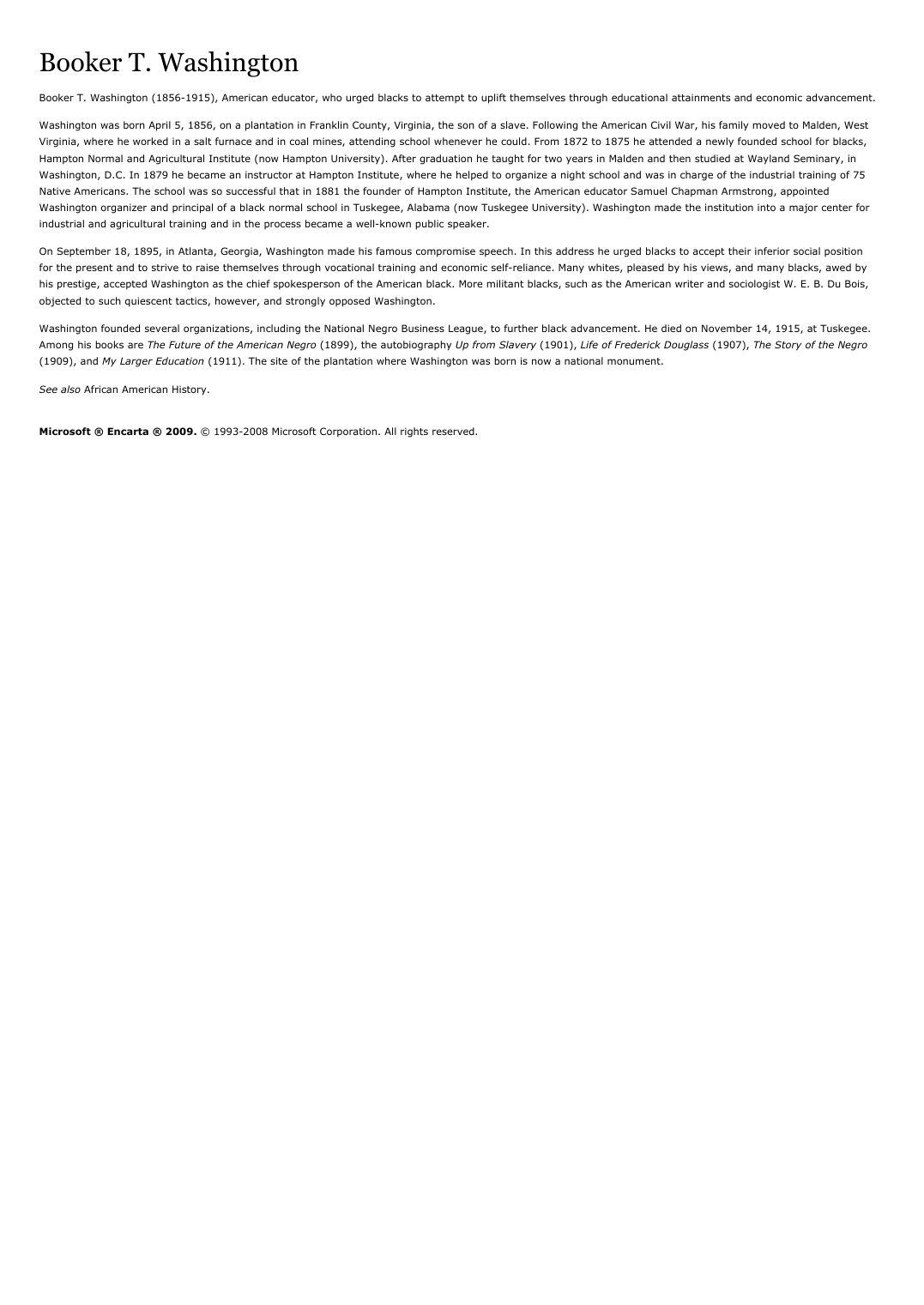Booker T.
Publié le 06/12/2021

Extrait du document
Ci-dessous un extrait traitant le sujet : Booker T.. Ce document contient 367 mots. Pour le télécharger en entier, envoyez-nous un de vos documents grâce à notre système d’échange gratuit de ressources numériques ou achetez-le pour la modique somme d’un euro symbolique. Cette aide totalement rédigée en format pdf sera utile aux lycéens ou étudiants ayant un devoir à réaliser ou une leçon à approfondir en : Echange
Booker T. Washington
Booker T. Washington (1856-1915), American educator, who urged blacks to attempt to uplift themselves through educational attainments and economic advancement.
Washington was born April 5, 1856, on a plantation in Franklin County, Virginia, the son of a slave. Following the American Civil War, his family moved to Malden, West
Virginia, where he worked in a salt furnace and in coal mines, attending school whenever he could. From 1872 to 1875 he attended a newly founded school for blacks,
Hampton Normal and Agricultural Institute (now Hampton University). After graduation he taught for two years in Malden and then studied at Wayland Seminary, in
Washington, D.C. In 1879 he became an instructor at Hampton Institute, where he helped to organize a night school and was in charge of the industrial training of 75
Native Americans. The school was so successful that in 1881 the founder of Hampton Institute, the American educator Samuel Chapman Armstrong, appointed
Washington organizer and principal of a black normal school in Tuskegee, Alabama (now Tuskegee University). Washington made the institution into a major center for
industrial and agricultural training and in the process became a well-known public speaker.
On September 18, 1895, in Atlanta, Georgia, Washington made his famous compromise speech. In this address he urged blacks to accept their inferior social position
for the present and to strive to raise themselves through vocational training and economic self-reliance. Many whites, pleased by his views, and many blacks, awed by
his prestige, accepted Washington as the chief spokesperson of the American black. More militant blacks, such as the American writer and sociologist W. E. B. Du Bois,
objected to such quiescent tactics, however, and strongly opposed Washington.
Washington founded several organizations, including the National Negro Business League, to further black advancement. He died on November 14, 1915, at Tuskegee.
Among his books are The Future of the American Negro (1899), the autobiography Up from Slavery (1901), Life of Frederick Douglass (1907), The Story of the Negro
(1909), and My Larger Education (1911). The site of the plantation where Washington was born is now a national monument.
See also African American History.
Microsoft ® Encarta ® 2009. © 1993-2008 Microsoft Corporation. All rights reserved.
Booker T. Washington
Booker T. Washington (1856-1915), American educator, who urged blacks to attempt to uplift themselves through educational attainments and economic advancement.
Washington was born April 5, 1856, on a plantation in Franklin County, Virginia, the son of a slave. Following the American Civil War, his family moved to Malden, West
Virginia, where he worked in a salt furnace and in coal mines, attending school whenever he could. From 1872 to 1875 he attended a newly founded school for blacks,
Hampton Normal and Agricultural Institute (now Hampton University). After graduation he taught for two years in Malden and then studied at Wayland Seminary, in
Washington, D.C. In 1879 he became an instructor at Hampton Institute, where he helped to organize a night school and was in charge of the industrial training of 75
Native Americans. The school was so successful that in 1881 the founder of Hampton Institute, the American educator Samuel Chapman Armstrong, appointed
Washington organizer and principal of a black normal school in Tuskegee, Alabama (now Tuskegee University). Washington made the institution into a major center for
industrial and agricultural training and in the process became a well-known public speaker.
On September 18, 1895, in Atlanta, Georgia, Washington made his famous compromise speech. In this address he urged blacks to accept their inferior social position
for the present and to strive to raise themselves through vocational training and economic self-reliance. Many whites, pleased by his views, and many blacks, awed by
his prestige, accepted Washington as the chief spokesperson of the American black. More militant blacks, such as the American writer and sociologist W. E. B. Du Bois,
objected to such quiescent tactics, however, and strongly opposed Washington.
Washington founded several organizations, including the National Negro Business League, to further black advancement. He died on November 14, 1915, at Tuskegee.
Among his books are The Future of the American Negro (1899), the autobiography Up from Slavery (1901), Life of Frederick Douglass (1907), The Story of the Negro
(1909), and My Larger Education (1911). The site of the plantation where Washington was born is now a national monument.
See also African American History.
Microsoft ® Encarta ® 2009. © 1993-2008 Microsoft Corporation. All rights reserved.
↓↓↓ APERÇU DU DOCUMENT ↓↓↓


